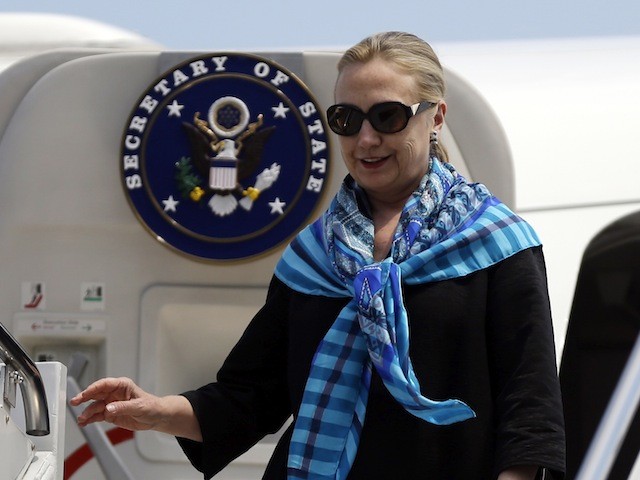The Daily Beast reports that one of the Benghazi fall guys is refusing to take the fall.
Raymond Maxwell was put on indefinite leave by the State Department after its Administrative Review Board (ARB) investigation of Benghazi for reasons that are still unknown to him. The person he claims made the decision to cast him out was Cheryl Mills--Hillary Clinton's former chief of staff and counsel at the State Department.
It is the second time Mills' name has turned up during scrutiny of the State Department's response to the attack.
According to a new report by Josh Rogin: "On the day after the unclassified version of the ARB’s report was released in December, Mills called Acting Assistant Secretary of State for Near Eastern Affairs Beth Jones and directed her to have Maxwell leave his job immediately."
Maxwell has now been sitting at home waiting for some formal action on his case for five months. And because he has not been fired, he cannot contest his treatment.
The question Maxwell wants answered is why was he kicked out of his job--Deputy Assistant Secretary of State for Near Eastern Affairs--while his supervisor, Acting Assistant Secretary of State Beth Jones, was not. In effect, Maxwell has been punished for something in which he had no involvement. He claims to have made no decisions with regard to security in Libya.
He is speaking out now, he tells the Daily Beast, "to restore my honor."
Three different officials told Rogin that security decisions about Benghazi were made at the Assistant Secretary level by Beth Jones and Liz Dibbie, neither of whom have been disciplined. That seems to be at odds with the findings of the ARB report (at least the declassified one) which faulted, "Systemic failures and leadership and management deficiencies at senior levels within two bureaus of the State Department." Jones and Dibbie were the "senior levels" of those two bureaus, not Maxwell and the three others who lost their positions.
According to an unnamed State Department official, there was a deal agreed to between Clinton's adviser Cheryl Mills and Assistant Secretary Jones. The deal was that Maxwell would be transferred to a new job once the scrutiny on Benghazi died down. But Mills reneged on the deal and instead put Maxwell on the administrative leave he has now been on for five months.
This is the second time that Cheryl Mills' name has come up in less than flattering circumstances relating to the Benghazi attack. Earlier this months, Gregory Hicks testified before Congress that Mills had called him to demand a report on a meeting Hicks had with Rep. Jason Chaffetz. Here is the exchange:
Last week, Rep. Issa subpoenaed one of the authors of the ARB report, Ambassador Thomas Pickering. However, since Maxwell is not mentioned in the unclassified version of the report, it is unclear whether Pickering will be able to answer questions about his situation.
Regardless, Maxwell's decision to challenge Clinton suggests that there may indeed be much more to the Benghazi scandal than is yet known.
Raymond Maxwell was put on indefinite leave by the State Department after its Administrative Review Board (ARB) investigation of Benghazi for reasons that are still unknown to him. The person he claims made the decision to cast him out was Cheryl Mills--Hillary Clinton's former chief of staff and counsel at the State Department.
It is the second time Mills' name has turned up during scrutiny of the State Department's response to the attack.
According to a new report by Josh Rogin: "On the day after the unclassified version of the ARB’s report was released in December, Mills called Acting Assistant Secretary of State for Near Eastern Affairs Beth Jones and directed her to have Maxwell leave his job immediately."
Maxwell has now been sitting at home waiting for some formal action on his case for five months. And because he has not been fired, he cannot contest his treatment.
The question Maxwell wants answered is why was he kicked out of his job--Deputy Assistant Secretary of State for Near Eastern Affairs--while his supervisor, Acting Assistant Secretary of State Beth Jones, was not. In effect, Maxwell has been punished for something in which he had no involvement. He claims to have made no decisions with regard to security in Libya.
He is speaking out now, he tells the Daily Beast, "to restore my honor."
Three different officials told Rogin that security decisions about Benghazi were made at the Assistant Secretary level by Beth Jones and Liz Dibbie, neither of whom have been disciplined. That seems to be at odds with the findings of the ARB report (at least the declassified one) which faulted, "Systemic failures and leadership and management deficiencies at senior levels within two bureaus of the State Department." Jones and Dibbie were the "senior levels" of those two bureaus, not Maxwell and the three others who lost their positions.
According to an unnamed State Department official, there was a deal agreed to between Clinton's adviser Cheryl Mills and Assistant Secretary Jones. The deal was that Maxwell would be transferred to a new job once the scrutiny on Benghazi died down. But Mills reneged on the deal and instead put Maxwell on the administrative leave he has now been on for five months.
This is the second time that Cheryl Mills' name has come up in less than flattering circumstances relating to the Benghazi attack. Earlier this months, Gregory Hicks testified before Congress that Mills had called him to demand a report on a meeting Hicks had with Rep. Jason Chaffetz. Here is the exchange:
Last week, Rep. Issa subpoenaed one of the authors of the ARB report, Ambassador Thomas Pickering. However, since Maxwell is not mentioned in the unclassified version of the report, it is unclear whether Pickering will be able to answer questions about his situation.
Regardless, Maxwell's decision to challenge Clinton suggests that there may indeed be much more to the Benghazi scandal than is yet known.



Comment